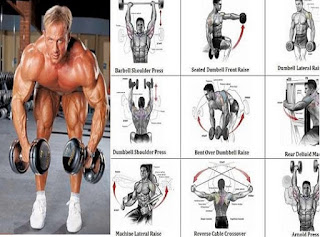Dumbbell Training: What Are The Benefits Of Training With Dumbbells?
Most health clubs and gyms offer rows of cardio equipment, aisles of weight-training machines, stacks of free weights and specific stretch areas to help members pursue their individual goals. When it comes to fitness equipment, there is no one “best” piece of equipment. Different types of equipment are purposefully designed to achieve specific fitness outcomes.
For those with goals related to strength training, there are countless options for increasing lean muscle or adding strength. Choices include the traditional weight machines, barbells or dumbbells, as well as a wide variety of specialized equipment such as kettlebells, medicine balls, sandbags and even oversized tires. Some forms of resistance training equipment, such as barbells, are more effective for developing max strength, while weight-training machines can help increase muscle definition and lighter forms of resistance such as medicine balls and kettlebells can be useful for improving movement-specific power output. Dumbbells are often used for joint-isolation exercises such as biceps curls, chest flyes or shoulder raises. Using dumbbells for full-body, multiplanar movements, however, can provide a variety of different strength outcomes. It also offers many benefits for cardiorespiratory fitness and flexibility. To help you select the best equipment for your needs, here are benefits of dumbbells:
Balance
Training with dumbbells requires more balance than with barbells or machines. Most of us are unsymmetrical in strength. One arm or one leg tend to be stronger than the one on the other side. With a barbell, the stronger arm cannot assist the weaker arm when you train with dumbbells. So when training with dumbbells, you have to use the resistance that the weaker arm can handle. Training with dumbbells will prevent the imbalance of strength and muscle development. Also enhance athletic performance, a significant consideration in fitness programs.
Unilateral Training
One huge benefit of training with dumbbells is that you can train one limb at a time. This can emphasize greater movement specificity in the training programs of athletes and greater program variety for bodybuilders. By training for one limb, you can improve the strength and muscle mass of a limb without effecting the other. Definitely helps in case you have an imbalance of development.
Stability
Dumbbell training requires more muscular control than barbells. You can check it yourself when comparing dumbbell benchpress with barbell bench press. So in order to train with dumbbells, you will need to recruit more stabilising muscles, enhancing joint stability and hypertrophy and kinesthetic awareness.
Safety
Some exercises can be done safer with a pair of dumbbells than a barbell. When performing certain types of leg exercises like step-ups or lunges, it is usually much easier and safer to hold a paid of dumbbells in your hands rather than a barbell on your beck. If you lose your balance, you just need to drop the dumbbells from your hands instead of letting the barbell slide off your back.
Dumbbells are much safer when you work out alone without any spotter. With dumbbell benchpress, you can put the dumbbells to your sides without any problem at all.
Another safety benefit of dumbbell training is that it can prevent potential injuries in the shoulders, elbows and wrists. You can see the problem when comparing doing barbell curl or barbell benchpress with dumbbell curl or dumbbell benchpress.
When you curl or bench press with a barbell, your hands are fixed and this leads to unnatural positions for the joints. But if you curl or benchpress with dumbbells, your elbows, wrists and shoulders are allowed to rotate freely and naturally.
Conclusion
Both dumbbells and barbells are equally effective in general for your training goal, but in some specific situations one type of exercise may be a little more beneficial for you than the other. So the best advice for you is to combine both dumbbell training and barbell training into your work out program and get the most out of both types of training.
For those with goals related to strength training, there are countless options for increasing lean muscle or adding strength. Choices include the traditional weight machines, barbells or dumbbells, as well as a wide variety of specialized equipment such as kettlebells, medicine balls, sandbags and even oversized tires. Some forms of resistance training equipment, such as barbells, are more effective for developing max strength, while weight-training machines can help increase muscle definition and lighter forms of resistance such as medicine balls and kettlebells can be useful for improving movement-specific power output. Dumbbells are often used for joint-isolation exercises such as biceps curls, chest flyes or shoulder raises. Using dumbbells for full-body, multiplanar movements, however, can provide a variety of different strength outcomes. It also offers many benefits for cardiorespiratory fitness and flexibility. To help you select the best equipment for your needs, here are benefits of dumbbells:
Balance
Training with dumbbells requires more balance than with barbells or machines. Most of us are unsymmetrical in strength. One arm or one leg tend to be stronger than the one on the other side. With a barbell, the stronger arm cannot assist the weaker arm when you train with dumbbells. So when training with dumbbells, you have to use the resistance that the weaker arm can handle. Training with dumbbells will prevent the imbalance of strength and muscle development. Also enhance athletic performance, a significant consideration in fitness programs.
Unilateral Training
One huge benefit of training with dumbbells is that you can train one limb at a time. This can emphasize greater movement specificity in the training programs of athletes and greater program variety for bodybuilders. By training for one limb, you can improve the strength and muscle mass of a limb without effecting the other. Definitely helps in case you have an imbalance of development.
Stability
Dumbbell training requires more muscular control than barbells. You can check it yourself when comparing dumbbell benchpress with barbell bench press. So in order to train with dumbbells, you will need to recruit more stabilising muscles, enhancing joint stability and hypertrophy and kinesthetic awareness.
Safety
Some exercises can be done safer with a pair of dumbbells than a barbell. When performing certain types of leg exercises like step-ups or lunges, it is usually much easier and safer to hold a paid of dumbbells in your hands rather than a barbell on your beck. If you lose your balance, you just need to drop the dumbbells from your hands instead of letting the barbell slide off your back.
Dumbbells are much safer when you work out alone without any spotter. With dumbbell benchpress, you can put the dumbbells to your sides without any problem at all.
Another safety benefit of dumbbell training is that it can prevent potential injuries in the shoulders, elbows and wrists. You can see the problem when comparing doing barbell curl or barbell benchpress with dumbbell curl or dumbbell benchpress.
When you curl or bench press with a barbell, your hands are fixed and this leads to unnatural positions for the joints. But if you curl or benchpress with dumbbells, your elbows, wrists and shoulders are allowed to rotate freely and naturally.
Conclusion
Both dumbbells and barbells are equally effective in general for your training goal, but in some specific situations one type of exercise may be a little more beneficial for you than the other. So the best advice for you is to combine both dumbbell training and barbell training into your work out program and get the most out of both types of training.




Commentaires
Enregistrer un commentaire